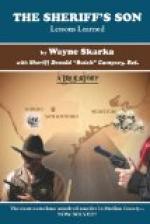Charlton filled in the ellipsis. “If it
isn’t I can stay away, can’t
I? Well, I’m not going to quarrel with
you, Beulah. Good-night.”
As soon as he was out of sight of the ranch, Charlton turned the head of his horse, not toward his own place, but toward that of Jess Tighe.
Dr. Spindler drove up while Beulah was still on the porch. He examined the bruised ankle, dressed it, and pronounced that all it needed was a rest. No bones were broken, but the ligaments were strained. For several days she must give up riding and walking.
The ankle pained a good deal during the night, so that its owner slept intermittently. By morning she was no longer suffering, but was far too restless to stay in the house.
“I’m going to drive Mr. Street over to the Tighe place in the buggy,” she announced at breakfast.
Her brothers exchanged glances.
“Think you’d better go so far with your bad ankle, honey?” Hal Rutherford, senior, asked.
“It doesn’t make any difference, dad, so long as I don’t put my weight on it.”
She had her way, as she usually did. One of the boys hitched up and brought the team to the front of the house. Beaudry took the seat beside Beulah.
The girl gathered up the reins, nodded good-bye to her father, and drove off.
It was such a day as comes not more than a dozen times a season even in New Mexico. The pure light from the blue sky and the pine-combed air from the hills were like wine to their young blood. Once when the road climbed a hilltop the long saw-toothed range lifted before them, but mostly they could not see beyond the bastioned ramparts that hemmed in the park or the nearer wooded gulches that ran down from them.
Beulah had brought her camera. They took pictures of each other. They gathered wild flowers. They talked as eagerly as children. Somehow the bars were down between them. The girl had lost the manner of sullen resentment that had impressed him yesterday. She was gay and happy and vivid. Wild roses bloomed in her cheeks. For this young man belonged to the great world outside in which she was so interested. Other topics than horses and cattle and drinking-bouts were the themes of his talk. He had been to theaters and read books and visited large cities. His coming had enriched life for her.
The trail took them past a grove of young aspens which blocked the mouth of a small canon by the thickness of the growth.
“Do you see any way in?” Beulah asked her companion.
“No. The trees are like a wall. There is not an open foot by which one could enter.”
“Isn’t there?” She laughed. “There’s a way in just the same. You see that big rock over to the left. A trail drops down into the aspens back of it. A man lives in the gulch, an ex-convict. His name is Dan Meldrum.”
“I expect he isn’t troubled much with visitors."’




